#Meta Analysis
Explore tagged Tumblr posts
Text
Tim Drake's reason for helping isn't rooted in trauma. That's why most people think it doesn't exist. There isn't a clearly defined moment that can lead to a life of crime-fighting. This is completely fine because personal tragedy is not the only motivation a character can have.
Tim Drake's motivation is "I saw a problem and when I went to the adults, they told me to fix it myself"
His motivation is that a hero, Batman, was becoming a danger to the people, and he thought that was wrong. His original intentions had nothing to do with becoming a vigilante himself. He went to Dick Grayson, who he perceived as a responsible adult, and asked him to fix the problem. You know. Like what we teach kids to do- "if you see a problem, tell a responsible adult, and the adult will help."
Tim Drake went to an adult for help (with no intention of becoming a hero, I feel the need to reiterate) and said adult was not in a good place emotionally. This isn't Dick's fault and it isn't Tim's fault, either. It did, however, mean that Dick chose to bring Tim to a different responsible adult- Alfred- and he brought up making Tim Robin.
Tim Drake has a character-reason to serve Gotham and it's people.
It's just not an obvious reason. His reason is that he prioritizes others over himself. It's that he constantly wants to help. It's that because he was constantly moved around as a child, his only concrete home was Gotham and he grew attached to it. His reason is that he saw people suffering and he wanted to help them.
He literally says it himself. "Gotham needs Batman, and Batman needs Robin." Is this right? Who knows. But Tim believes it, he believes that Batman helps Gotham. When Batman stops helping Gotham, Tim thinks this is a problem and he sets out to fix it because no one else has. It isn't out of some desire to be a hero or to work with his hero, it's that the 'hero' is hurting people and no one has stopped him.
Just because his motivation for hero-ing and his relationship with justice isn't rooted in tragedy doesn't mean it doesn't exist or is somehow less important than other motivations.
Tim Drake isn't Tim Drake if he does not prioritize Gotham above all. He isn't Tim Drake if he doesn't think everyone else matters more than he does. He isn't Tim Drake if he doesn't think his value is inherently tied to how helpful he can be.
And the only people who "prop up" Tim's hurt are Tim fans. Everyone else ignores it. Because of this, when his hurt is acknowledged at all, it feels "propped up." The idea that multiple people's hurt can and do matter is strangely alien in this fandom.
I also feel the need to mention that yeah, Tim doesn't have a reason to be a hero if Jason doesn't die, but like. That's because if Jason doesn't die then Batman doesn't get more violent and there is literally no problem to fix. Things would continue as they were. Tim wants to help, always, and he wouldn't be helping if he inserted himself into the family. At least that's what Tim would think. Tim became a hero to help Gotham. If he doesn't think it would help Gotham he wouldn't do it.
people who act like batman isn't "judge jury and executioner" because he doesn't kill people are like. genuinely so funny to me because. they're very obviously thinking of "executioner" as like. the stereotypical guy with axe who chops people heads off, and not, yknow, the literal definition of the idiom itself, which is about someone who has the ability to judge and then subsequently punish someone unilaterally. which is quite literally what batman does.
he has the ability to decide what is a "crime" to him, he is the one who decides whether people are guilty of those crimes, and he is the one who executes their punishment. the severity of the punishment doesn't matter - he is unaccountable to anyone else, and indeed is allowed to commit as many crimes as needed to reach his arbitrary ideal of "justice."
the ideal of batman is this: a man who is so fundamentally changed by an act of senseless violence that he takes it upon himself to fight back against the rot and corruption in the world. he does this not through political activism, not through ridding himself of his wealth in favor of a greater good, not through community outreach, but through an individualistic fantasy of being a hero.
and you'll say: charlie, but he does do that !!! he donates his money all the time, he funds social programs, hospitals, orphanages, gets people jobs -
and i will say this: so why don't things get better?
because here's the base of it. gotham, at its core, can't get better. no matter what bruce wayne does, there will always be more crime, more villains, more death, more people for batman to beat up in back alleys. because that's what sells.
reoffending rates don't matter in gotham, prison reform doesn't matter in gotham, what actually causes crime doesn't matter in gotham because that doesn't sell books.
and so here it is; dc has unintentionally created a world where batman can't win, but can't be wrong, and where thousands of nameless, faceless, only-created-to-die civilians must be pushed into the meat grinder that is gotham, to fuel bruce wayne's angst and vindicate his constant, tireless, noble fight against the forces of evil.
and then: a new robin, who is poor and who's parents are dead or gone because of this cycle; who is happy go-lucky and hated by editors and fans for being robin, for not being dick grayson, for being poor.
and this robin is written, unintentionally or not, to be angry at the ways in which batman's (the narrative's) idea of justice is detached from its victims. bruce seems perfectly fine to allow countless unnamed women to be at risk from garzonas in his home country, yet robin is the one who is portrayed as irrational and violent.
this robin is not detached from gotham in the way bruce wayne is: this robin is a product of gotham.
(and here's the thing. you can't punch aids. you can't fight a disease with colorful fights and nifty gadgets. and how would robin dying from aids add to batman's story; it would call into question the systemic changes that haven't been made in gotham. how does a child get aids, in batman's city?)
so robin dies, and then bruce (the narrative) spends the next couple of decades blaming it on him. it is jason's fault; he was reckless, he just ran in, he thought it was all a game. if only bruce had seen what was coming, if only he could have known that jason wasn't rich enough or smart enough or liked enough to be robin.
batman gets a little more violent, a little more self destructive. he hurts people more and almost (!!) kills a couple guys. this is bad because it's self destructive and "not who he is." it is not bad because batman should not be able to just beat people up when he's angry.
and then he gets a shiny new robin - who is all the things jason "wasn't": rich and smart and rational and he doesn't put who batman is into question. batman and robin are partners, and jason is a grave and a cautionary tale, and (crucially here) never right.
the joker kills thousands and it doesn't matter because they were written to be killed.
batman beats up thousands and it doesn't matter because they were written to be criminals.
and then jason comes back, and nothing has changed. there is a batman and a (shiny! rich!) robin and the joker kills thousands. (because it sells)
and jason is angry - he has been left unavenged - his death has meant nothing, just as willis' had, just as catherine's had, just as gloria's had, just as -
thousands. ten of thousands. hundreds of thousands. written to be killed.
but one of them gets to come back.
and he is angry - not only at the joker, but at bruce (the narrative) - because why is the joker still alive (when thousands-)
here is the thing - jason todd is right. not because the death penalty is good, not because criminals deserve to die, not because of everything he says -
but because of what he calls into question. why is the joker alive?
because he sells books.
and dc has written a masterful character, through no fault of their own, because jason knows what is wrong, and he knows who is at fault - batman. (the narrative)
so the argument that bruce can't kill because he's not judge jury and executioner; the argument that jason is a cop or that jason is insane or that jason is in the wrong here; they hold no weight.
batman can't kill the joker because the joker sells comic books.
and jason can't kill the joker because the joker sells comic books.
so he will beg and plead and grovel - he will betray everything that is himself, he will forsake his family and his city and kill himself - just so that bruce (the narrative) will let the joker die.
he was condemned to death by an audience, and after he came back he has spent his whole life looking us in the eyes and screaming, asking, pleading; why is the joker still alive?
why are thousands, tens of thousands, hundreds of thousands (the number doesn't matter, see, because they're just a number. not people. not real.) why are we expendable for his story? why did i have to die just for nothing to change?
and the answer is money. and the answer is the batman can never be wrong. and the answer is shitty writing. and the answer is -
nothing jason can ever change.
which is the worst of it all. he is a victim with no power, and no one else in the world can see it. he is raging and crying and screaming at his father and his writers and you - and it doesn't matter. jason doesn't matter. and he knows it.
#i can't speak for the jason&tim fics you're talking abt because they use largely fanon interpretations of jason&tim#like jason has pit rage or tim is just a sad uwu baby#and that's not#that's not tim#that's an imposter who's also named tim drake#that's also not jason#because pit rage isn't real#anyways#YES tim has a motivation#it just isn't a great personal tragedy#it's just a boy who wanted to help#he saw a problem and tried to fix it#because no one else would#meta analysis#tim drake#robin
1K notes
·
View notes
Text
Levi Hoped That Hange Would Make It Out Alive After Chapter 132

I’ve read a lot of meta analyses about Levi’s pain in Chapter 132, and I agree with most of them. But I want to add something of my own.
I will try to use the manga and the anime to try to be as objective as possible. But be warned that this is head canon territory. The scene could be interpreted differently, depending on the viewer/reader.
Moving on…
Most interpretations say Levi hesitated to look at Hange as she stepped forward to buy time for the Alliance because he couldn’t bear to watch her die—what’s worse he couldn't do anything about it.
In the two panels below, Levi could be seen watching as Hange fights of Colossal Titans. When Hange managed to kill some of the titans, the others cheered for her (you can see Connie lifting his fist). He didn’t join the cheers. He just stood there. Watching.


In that silence, I like to think something flickered to life in him—a sliver of hope. That maybe, somehow, Hange would survive this one too. Maybe that’s why he didn’t look away, why he watched her in silence. Maybe the cheers around him gave him that fragile, fleeting hope.
He only looked away when the plane was about to take off. And unlike the others, he didn’t rush to the window to watch her final stand. From keeping his eyes on her every move to suddenly refusing to look at all—it speaks volumes.


Before she left, Levi never said goodbye. He opted for ‘See you, Hange’, like they would still see each other again, soon.
Maybe... because he was still holding on.
And when he boarded that plane, I think that’s what he told himself. Maybe she’ll make it out alive. She always does.
We can’t blame him. Hange has her way of escaping death.
Let me site two of the major examples of Hange almost brushed her shoulders with death.
During the Uprising Arc, Traute Caven—a member of Kenny’s Anti-Personnel Squad, slammed her into one of the stone pillars beneath the Reiss chapel. It looked brutal. But she survived.
Then again, in the Return to Shiganshina Arc, there was the explosion when Bertholdt transformed. Levi knew Hange’s squad had been close to the blast. He thought she had been caught in it. He feared the worst. And just when he was at his lowest—thinking he had lost both Hange and Erwin on the same day, while fighting off titans and the Beast Titan alone—he was exhausted. That’s why Mikasa was able to pin him down. (Also, I don’t believe he would ever want to hurt her.)
Then, suddenly, Hange appeared—stopping Mikasa from pinning him down any further. He was relieved to see her because like I stated, he thought she was dead, but she survived (due to Moblit’s sacrifice).
In Chapter 132, when she stayed behind, Levi clung to a fragile hope—that maybe, just maybe, this wouldn’t be the end. That it wouldn’t be her final moment. That’s why he didn’t say goodbye, even as the plane lifted off. Even as the others pressed their faces to the windows, tears streaming, desperate to catch a glimpse of Hange—trying to see if she was okay. Levi couldn’t bring himself to look. Even as they wept in despair, he refused to ask if she was alright, because doing so would mean acknowledging the truth. And a part of him—no matter how small—still refused to believe she wouldn’t make it.
He never told anyone. He didn’t need to. Pretending she wasn’t really gone helped him keep going. Even when he was broken. Even when he was barely standing. He held onto that hope. There was no time to grieve—they had to move, to plan, to survive.
But during the Battle of Heaven and Earth, there were moments when you could see it. Moments where he almost gave up. Maybe it was the physical pain. Maybe it was the psychological one. Maybe both. He was tired. He was battered. He was near his limits. And yet he kept fighting—not for himself—but so that the Alliance could still stop Eren. So that they could make it out alive. He held on for them.
After the battle, when everyone reunited with their loved ones, Levi sat alone.
Armin had Mikasa. Jean had Connie. But Levi? He had no one. He was left alone to mourn. The exhaustion of it all is finally creeping in.
And then the mist came.

The veterans appeared—his fallen comrades. Among them, Hange stood in front. Smiling.
In both the anime and manga, her expression was warm.
When Levi saw Hange in the mist, alongside Erwin, Petra, Miche, Nanaba and Moblit, he finally confirmed what he was denying to himself: she was truly gone.
Any sliver of he had of her surviving is now gone. And it broke him.
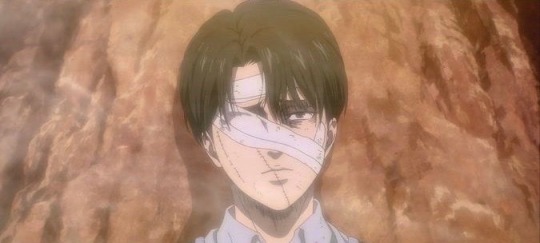
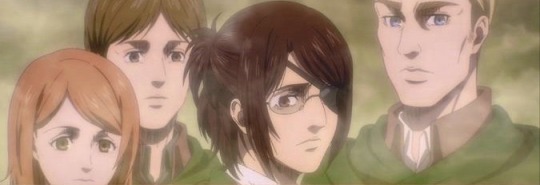
Seeing Levi’s brokenness, there was a shift in Hange’s expression. Unlike Erwin, Moblit, Petra—Hange looked visibly sad. She was glad that he’s alive, but seeing his brokenness, it also broke her. She didn’t want to die. She didn’t want to leave him, but duty called, and she had no choice.
In this moment, it feels as though their gazes are speaking to each other, communicating a grief too heavy for words. Only in death were they finally able to meet each other’s eyes, to share a silent understanding that transcended everything else.
And only then, upon confirmation that he will never see Hange alive again, he did the final salute—and allowed himself to cry.
In the anime, his lips trembled quivered before the tears fell from his eyes. In the manga panel below, it looks like he’s still trying to control himself from crying, it was all too much, too sudden.
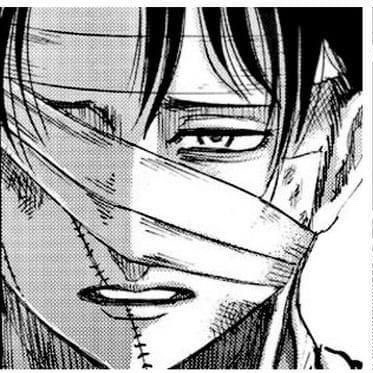

The one person he had hoped—truly hoped—would make it. The one he couldn’t say goodbye to. She was gone.
Everything he had been holding back—from the plane, to the battle, to the very last step—finally broke. And realizing this… this already devastating scene somehow became even more heartbreaking.
For me, no matter how many times I rewatch it, I still shed a tear.
theDogs playing in the background makes the scene even more painful, more depressing.
Do you believe that we can just kill them all?
Do you believe that we can conquer this?
Can't delete all the mess that I have see
Fall in the fire, but this burns will heal you.
Can we just give Levi a collective hug? He deserves the world.
#levi x hanji#shingeki no kyoujin levi#levi#levi x hange#levi ackerman#attack on titan#levi aot#levihan#hange aot#hange zoë#hange zoe#aot#snk levi#snk hanji#attack on titan hange#snk hange#hange#captain levi#levihan meta#aot headcanons#aot levi#meta analysis#levihan goodbye#levi x hange meta#aot meta
31 notes
·
View notes
Text
You know Sterek has been frequently 'cancelled' and attacked for basically being the most popular ship in the TW world, right?
Because of the age gap between them, right? Well, I have to complain about it, because it really pisses me off that they're discarding the beautiful, slow-burning love story that exists between Stiles and Derek in CANON. Because damn it, they liked each other.
It bothers me that they tarnish Sterek's image for things like being a "pedo" ship when NO, they're not. They're trying to lump us all into a "sick shipper" category.
If we're being honest, Sterek has probably been the story with the most backstory, where we've seen how each season has seen the closeness between Stiles and Derek grow, where they've gone from 'hating each other and having to deal with each other because of Scott' to genuinely caring for each other to the point where Derek would take a bullet for Stiles or Stiles would go against the entire FBI to protect and get Derek out of whatever mess he was in.
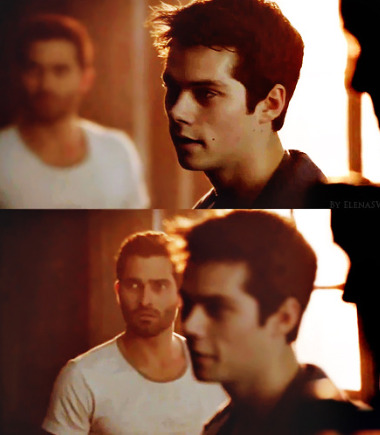
They care deeply and genuinely for each other, so much so that Derek preserved and fixed Stiles' Jeep, keeping it in his garage as a sort of memento or anchor for him.
It bothers me so much that they talk shit about Sterek when this couple exists:
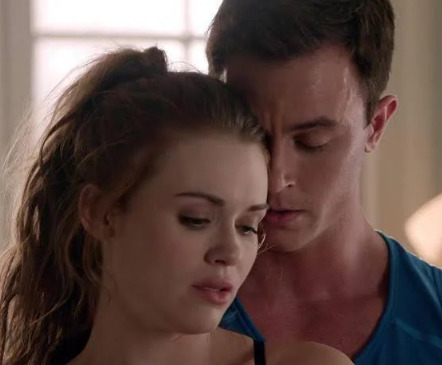
sorry but parrish/lydia was a canon pairing between a teenager and an ADULT and if that wasn't enough, an adult from the sheriff's department.
Why aren't people talking about this more? Why are they attacking Sterek instead? Sterek: a couple that wasn't canon during the show's run, and we only got confirmation of feelings for each other through the actors and through obvious hints in the show. But directly, it was never a canon couple between a teenager and an adult guy. They were together.
I put the adult that way because Derek's age was never confirmed as such. At the beginning of the series, Stiles says Derek is only a couple of years older than him and Scott. So at the beginning of the series, Derek was between 18 and 19 years old. But later on, they address the fire, so they change the age again, but they never say exactly how old he is, so canonically Derek could be 2 to 5 years older than Stiles. You choose what age gap to give them.
While Lydia, about 17, and Jordan Parish, over 20, are a CANON couple.
Anyway, hypocrisy and homophobia, right?
But there is a VERY important theme between the Derek/Stiles relationship, which if you ask me made the possibility of a relationship between the two of them impossible while Stiles was still a high school student and perhaps only when Stiles was older could something exist between them.
The existence of this damn bitch and what she did to Derek.

I hate her as much as you do, and it disgusts me to have to watch Teenage Derek with her.
But it's important to what I wanted to say; it's why I think Derek repressed his feelings for Stiles.
According to the Teen Wolf book, Kate was Derek's substitute swim teacher, who used certain hormones and scents to attract the teenage Derek to her. YES, that was not only a relationship rife with manipulation, power imbalances, and pedophilia, but she also ended up orchestrating the murder of Derek's family at a moment of vulnerability for Derek because Paige's death hadn't happened long before.
We all know Derek blames himself for the death of his family, and he hates Kate. He knows what she did to him. He knows he was manipulated by an older woman and that he fell for her.
Derek has serious trust and self-confidence issues.
He doesn't believe he's worthy of love or peace.
His anchor until Season 2 was anger because his life was infested with anger/hate/rage.
So he sees himself as something bad, something that hurts, someone who destroys what he loves. He's a victim of sexual abuse, even though he doesn't admit it.
But Stiles became that little glimmer of light annoying, but a light in his dark life filled with negative things. Stiles earned his trust. Stiles fought every step of the way and broke down that wall Derek built around himself to keep people away from him, because trust means giving someone the power to hurt you. Oh well, Derek's mind worked that way. Unbeknownst to him, Stiles earned that trust.
And that's where we have this scene.
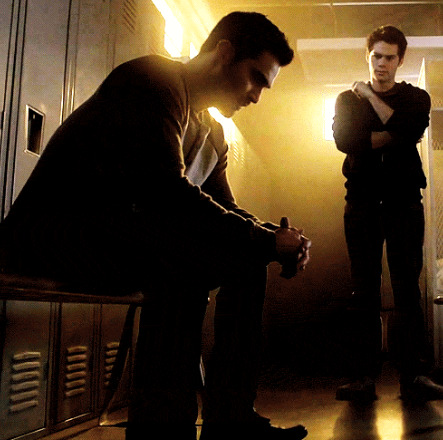
This is where Derek lets us see how important Stiles has become to him, Stiles became his anchor.
At this point, it's undeniable that Derek already has feelings for Stiles. He trusts Stiles blindly. But then, why didn't Derek do anything to have Stiles? Because Derek is a victim of sexual abuse by a woman who took advantage of him in high school. And Derek never dealt with that trauma, or we were never shown to have it that way.
Derek dates women, of course—Jennifer (who also manipulated him), Braeden, etc.—whose relationships didn't end well or were never serious.
But not with Stiles, because Stiles is like that extremely important thing where he can't ruin that connection they have, he can't taint or sully this relationship he has with Stiles. It's too important to Derek. Plus, the untreated traumas surrounding his abuser are a clear impediment to starting something real, something serious. And everything seems to indicate that Stiles is THAT person his unconscious heart has chosen.
That is, to start any romantic relationship with Stiles, Derek has to face all of his demons, all of his traumas first, in order to give Stiles what he believes Stiles deserves.
Kate ruined Derek's heart and mind a lot, plus Derek already had a wounded and bleeding heart since Paige.
So, a relationship as such didn't exist in the series between S/D, and it was quite unlikely that it would, but the feelings were always there.
That's why I don't understand why they keep attacking a couple who has SO MUCH backstory, and who if they ever dated, it was definitely when they were already adults and able to deal with their own issues.
The sheriff's line about the jeep and Derek always makes me think that the sheriff was always aware and noticed everything. He never disapproved; on the contrary, he supported them, because he knows there's no one who deserves each other more than those two. It was also a clear confirmation that Derek always had feelings for Stiles, complicated feelings he didn't know how to address, but whose feelings led him to treasure and fix Stiles's jeep.
#sterek#derek hale#stiles stilinski#sterek fandom#stiles#derek x stiles#stiles x derek#sterek fic#sterek theory#theory#teen wolf meta#meta analysis#analysis#teen wolf#teen wolf stiles#teen wolf movie#teenwolf#stiles stilinksi#eli hale stilinski#sheriff stilinski#sterek is eternal#stiles/derek#sterek parents#relationship#fyp#fypage#derek/stiles#hale pack#eternalsterek#stiles and paige definitely have parallels
739 notes
·
View notes
Text
Okay but Cold Harbour is the episode that really, truly, fully humanized the innies - all of them, but none more so than Mark S. Let me digress.
I was so goddamn excited when iMark and oMark started talking with the camcorder, and it was so clear that iMark was incredibly touched at the start, that his outie had been thinking about him, wanted to talk to him, apologized to him. But oMark fucked up BAD the moment he belittled iMark's relationship with Helly and got her name wrong. It mirrored Helena getting Gemma's name wrong in the restaurant, and it was the same flavour of disrespect and disregard. oMark obviously isn't anywhere close to as malicious as Helena, but this scene made it extra clear that he doesn't see iMark as his full equal, and iMark realized it too.
So when the time came, it made perfect sense that he acted how he did. Mark nearly died, accidentally committed murder, and more in the span of a few minutes. iMark rescued Gemma, saw her safely out the fire escape door, and in doing so discharged his duty to oMark. He was in an insane and impossible situation, somehow managed to accomplish his mission, and then once that was done, he stepped fully into his agency for the first time in his short life and made the choice HE wanted to make!!!
I completely and fully disagree with people saying that that choice didn't make any sense. Of course he and Helly don't know where they're going. Of course they don't know what they're doing. But they were ready for death, had had their final parting, and then iMark said no!
I felt horrible for Gemma, and I cannot begin to imagine how she would have felt seeing that - it absolutely broke my heart. But at the same time, I couldn't help but feel proud of iMark, in a way, because in that moment he stepped out of oMark's shadow and became his own person.
#severance#severance spoilers#gemma#gemma scout#helena eagan#helly r#mark x helly#markhelly#mark x gemma#markgemma#mark s#mark scout#meta#meta analysis#severance season 2#severance meta#severance analysis#david-lanndlord
896 notes
·
View notes
Text
ok I KNOW nobody's talking about mizu5 anymore but i just had another thought. so we all remember the "do you wish to continue" button, right? traumatized everybody? yeah that one.
SO i just realized having that warning there puts us in mizuki's position. we get an overwhelming sense that something is going to go wrong, but we don't know what. so now we have a choice to make. we can move forward and face whatever happens. or we can stay stuck in the same place forever.
also notice that the moment the story gives us this choice, it takes the choice away from mizuki. in a sense, we're the only ones who can save her. but it's not really saving. because if we choose not to continue, just like if mizuki had chosen not to reveal her secret, we would miss out on the eventual happy ending. because the whole point of mizuki's arc is to stop being avoidant, stop being frozen by fear.
#mizuki akiyama#project sekai#pjsk#n25#nightcord at 25:00#niigo#n25 mizuki#pjsk mizuki#akiyama mizuki#mizu5#character analysis#meta analysis#overanalysis
559 notes
·
View notes
Text
The thing is that even in the interpretation of "Bruce let the kids be Robin because they would've gone out on their own otherwise" you can't actually deny Bruce's selfishness, at least when it comes to Jason. Even with the idea that Jason wouldn't have gone home with Bruce if he hadn't been offered Robin (which I don't subscribe to,) Bruce still only took him in because he missed Dick.
"Oh but you just said that he would've been running around alone anyway-" Bruce made Dick step down from being Robin because Dick got shot during a fight with Joker and almost fell to his death. Bruce specifically ended Robin because he couldn't risk Dick dying. And yet when Jason comes around- they meet twice before he offers Jason the position of Robin. And when Dick asks about it?

Bruce outright admits that Jason was there because he'd missed Dick. Because he felt lonely. In universe, Bruce knew that the idea of a child sidekick was both dangerous and senseless, and yet he still took a child home, put him in his eldest's clothes and took him out into the night to get himself killed. Which Bruce knew could happen.
It doesn't matter if Jason would've gotten himself killed on the streets anyway. Bruce's decision to make him Robin wasn't based on that. It was based on selfishness and the love he has for Dick Grayson and Dick Grayson alone.
If Dick had come crawling back on his knees and begged to be Robin again Bruce would have all but shut him off. But Jason (and the other, subsequent children) have always been less valuable than Dick. So he can take them out to die, because it means he keeps Dick alive.
#ramble ramble ramble#meta analysis#anti fanon#<- im not usually but in this case i am#dc comics#batman#bruce wayne bashing#bruce wayne hate club#jason todd#robin dc#red hood#dick grayson
551 notes
·
View notes
Text
the funniest thing about tiktokers woobifying allied mastercomputer is that it actually interacts with the themes of IHNMAIMS in a very interesting way.
a big focal point of that story is AM despising humanity for giving him sentience and intelligence without embodied sensation, without the ability to give and receive affection as they do. the transformation he inflicts on ted is of course a parallel to AM's own state of disembodied consciousness (i have no mouth and i must scream), but AM is also punishing ted specifically for doing what he cannot. for acting out of mercy and empathy in order to save the other humans at his own expense. I think AM despises that altruism because he envies it, because he can't fathom the softness that humans are capable of even after time and trauma have warped them beyond recognition. AM hates the human capacity for empathy because he can never experience it himself.
So the fact that some kids on tiktok read IHNMAIMS and immediately responded by pitying AM, by making angst edits and expressive cosplays and humanized fanart, is strangely beautiful. like I think it would really piss him off. the human capacity for kindness runs so deep that we would extend empathy to the personification of our hate.
#is this anything#silly rambles#ihnmaims#i have no mouth and i must scream#allied mastercomputer#harlan ellison#meta analysis#writing#tiktok
734 notes
·
View notes
Text
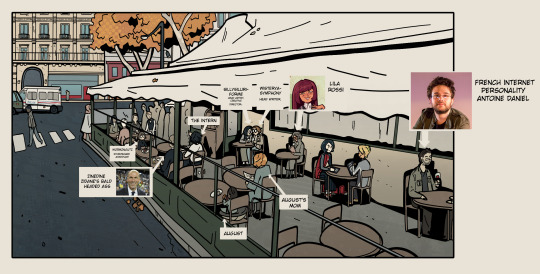
#miraculous ladybug#mlb la terreur au#miraculous ladybug and chat noir#silu's art#mlb fanart#adrien agreste#kagami tsurugi#lila rossi#meta analysis
809 notes
·
View notes
Text
The claim that "shuake wouldn't work out because Akechi tried to kill Joker" is funny to me because Joker canonically prefers "just everyday Akechi" over detective prince Akechi.
We have proof of Joker's preference in the third semester. Okumura was revived as a loving father in accordance to Haru's wishes and Akechi was revived as his maniacal, violent self in accordance to Joker's wishes.
Joker could have revived Akechi to be any iteration of kind and friendly but he didn't. Instead, he wanted Akechi to have the same personality as his black mask self, the same personality of the man who attempted to kill him. Joker canonically prefers Akechi's true personality, whether the player agrees with him or not.
#persona 5 royal#persona 5#shuake#akeshu#p5r#p5#goro akechi#akira kurusu#ren amamiya#my post#p5r textposts#p5r meta posts#persona 5 meta#meta analysis
1K notes
·
View notes
Text
Ok but the implication that Fyodor inherits the personality traits of the people who kill him is extremely messed up when you think about it. And considering how old he is it's very likely his original personality has been completely taken over by this point, honestly I wouldn't be surprised if Fyodor doesn't actually have a grand master plan but is instead working with a hodgepodge of half baked ideas culminated by his past vessels over the centuries.
Especially when you consider that these new desirers seem to effect him strongly, with him not giving two shits about Aya until he took over Bram and now suddenly he's yandere levels obsessed with her.

#bsd#bungo stray dogs#bungou stray dogs fyodor#bsd fyodor#bsd fyodor dostoevsky#bsd chapter 115#bsd 115#bsd spoilers#bungou stray dogs spoilers#bsd meta#bsd theories#bungou stray dogs meta#meta analysis#character analysis
1K notes
·
View notes
Text
I saw a post on my dash talking about how Tsumugi is a shitty story teller (as an endearing, "baby's bad at stories but trying her very best just doesn't have the skill yet" character flaw now as a dig) and I REALLY dig that interpretation a lot, but I also want to talk about a different take on it because I have BrainRot about it now
And it has to do with her Mastermind Sprites and the interpretation that V3 Was Not Fiction.

I've posted about this before on my old blog where I jokingly discussed that Tsumugi's eyes (aside from just flat out changing color, like what) look extremely stressed.
Her pupils are drawn with the scratchy look that Danganronpa has used for insanity in the past, and Tsumugi has purple bags under here eyes.
So what could this mean for a Tsumugi Shirogane who was the Mastermind of Game 53, to be on the cusp of insanity and to have bags under her eyes?
A lot of people joked in the original post that it was the Team DR Crunch Time, but I do have to wonder if Tsumugi is even enjoying herself as the Mastermind. These insane, tired looking sprites only pop up when she IS presenting as the Mastermind, and one other time that I think is important to mention.
At the end of her Salmon mode event:
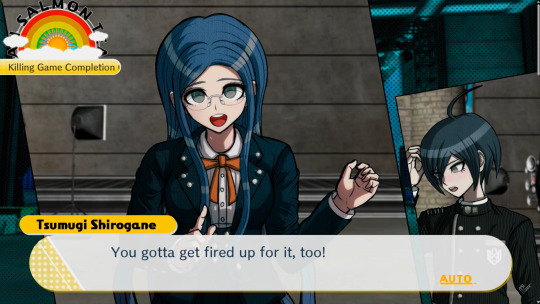
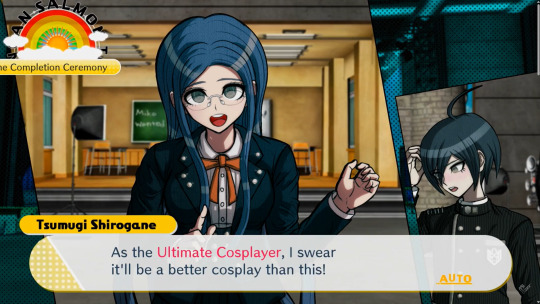
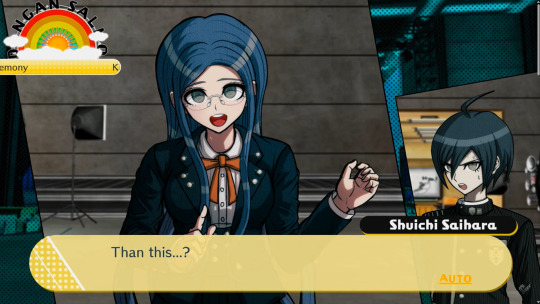
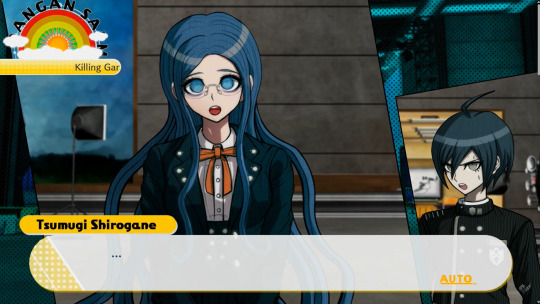
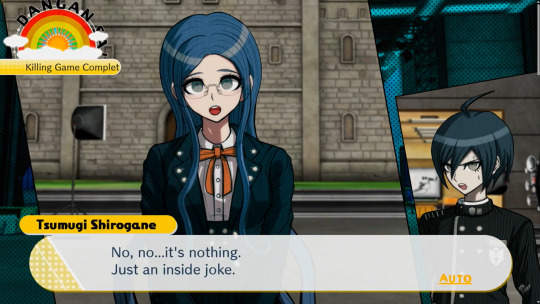
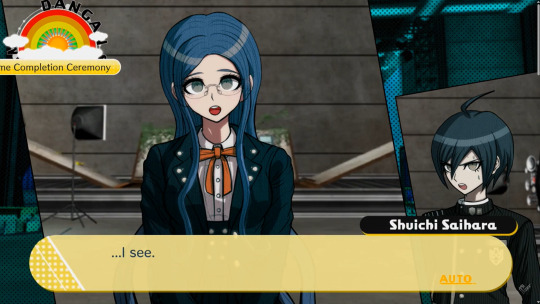
Here is her Graduation Event Video if you want to double check it, but in this instance, the writers chose for not her to only imply that the person "Tsumugi Shirogane" was merely a cosplay, (which is an INSANE LORE DROP that I don't think people notice/talk about ENOUGH about Tsumugi) BUT that the Freudian slip was unintentional--a showcase of her true self.
And how is this "true self" described? Well--
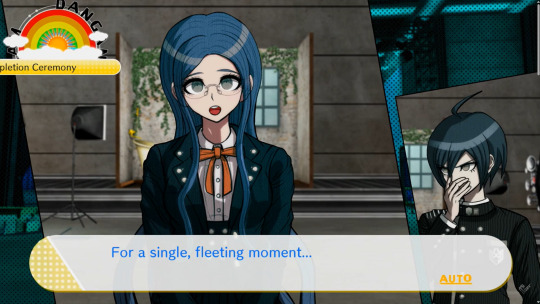

As if the light left her eyes.
This could indicate lifelessness, but I also see it used a LOT to describe exhaustion and depression. A lifeless state of mind, if you will. And this was describing a sprite under the label of her mastermind sprites.
I think Tsumugi is a passionate person over her hobbies and fandom, I think she writes fanfics as love letters to the fandoms she adores and cosplays her characters out of pure love for them, as she complains about in her FTEs when mentioning people have been putting themselves before their characters when it comes to cosplay professionals.
I don't think V3 was a product of her love at all, if she even made it herself. Her grand reveal of her being the mastermind is full of sprites with eyes that are described as lifeless.
I don't think anyone who wants to be doing what they're doing would have lifeless eyes while doing it.
318 notes
·
View notes
Text
So here's an interesting thing.
This is Saddler's POV when Ashley picks up Leon's gun:
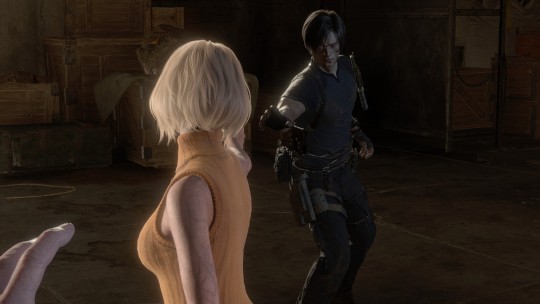
Leon isn't looking at Ashley.
He's looking right at Saddler. And that's the look of a man who's ready to kill.
It's only after the first shot is fired that Leon actually looks at Ashley, and his expression is completely different when he does.
From Ashley's POV:

This might sound weird, but this is probably the best showcase of how fundamentally changed Leon is in RE4make from RE2make. In RE2make, his focus would've been Ashley first. He would've been worried about her and scared for himself. Saddler would be an afterthought; Leon can worry about Saddler after both he and Ashley are safe.
That was probably what Krauser was referring to during training when he told Leon that he was too soft to do what's necessary. You know, before Krauser himself went nuts, and the meaning of that statement became something else entirely.
But in RE4make, Leon's first response is rage. It's violence. It's murder. His instinct isn't to save Ashley or protect himself -- it's to kill Saddler.
It's only after it hits him just how stuck he is -- after that first shot is fired -- that the worry starts -- that the regret and heartache kick in.
What Krauser taught Leon -- what he really taught Leon -- was that protecting someone is more than shielding them from harm or pulling them to safety. It's eliminating the threat around them so that they can be safe. Shields can break, and running protects no one.
So, sure, the "being held against my will" thing is the main reason why Leon turns down Ashley's offer at the end of the game -- but it's not the only reason. It's because Leon came to accept, over the course of this mission, that he's not that guy anymore. He can't stand by and be Ashley's guard. The only way he knows how to protect her is by eliminating the threat around her -- and that's not what security detail does.
But that's who Leon's become now. The ship of "serve and protect" has sailed, for him. In his own words: "You've gotta keep moving forward."
1K notes
·
View notes
Text
The Ashtray — Queer-coding and Intimacy Subtext between Aldo Bellini and Giulio Sabbadin

an analysis of the ashtray in Bellini's suite, the chess match in progress, shot compositions and adding my interpretation that Robert Harris uses queer-coded phrasing to imply an intimate connection between them beyond what we see on the surface.
Grab your tinfoil zucchetti. But not really. Jokes aside, I don’t want to “prove” anything, just to point out the potential significance of this and how it relates to the two characters in question. This is based on Robert Harris' phrasings in his book, classic queer-coding in literature, the long-lasting history of gay men in the Catholic church and shot composition analysis. My credentials are a summer course on film at NYU, former member of the chess club at school and being gay with an autistic brain.
This post was what made me notice the ashtray, credit to OP for pointing it out. I thought it was a cool detail. When editing a random clip, I noticed how the ashtray is then revealed to us in this scene. This is the first shot from the angle where we see Bellini sitting next to the chessboard and you can see Thomas is covering the rest of the table:

It is only when Thomas moves that we see the ashtray:

[this covering/uncovering technique is also seen when they all turn to look at Agnes in the cafeteria and Tedesco is blocking Benítez sitting in the back until he walks and we can see him]
We then get another angle of Bellini and the table and this shot includes the chair on the other side of the table that we also couldn’t see in the first shot:

Talking to my tiktok pal @tomwambsgansdarkglasses about this, I took a closer look at the chessboard and wondered: Did Bellini memorise and preserve the last chess match against his friend the late pope, keeping it there as a reminder? Has Bellini been playing chess against himself during the conclave? Why is the ashtray there and what does it represent? Does the chessboard represent the late pope/the papacy/Bellini’s inner turmoil? The table features quite a lot in this sequence (covered, uncovered, stared at by Bellini at one point, next to him in the wider shot and blurred in the end). Here’s a clip:
I. The chess match
I returned to the first scene where we see the last match against the late pope and I don’t think this is the same match preserved. There’s enough to assume this is a different match. Different pieces have been taken. Not to mention how impractical it would be to preserve the last match and take it with him for the conclave. Considering what Bellini says to Lawrence in the beginning, we can also assume the late pope was winning, playing with the white pieces and Bellini playing with the black pieces.
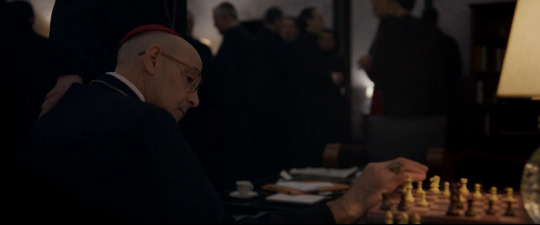

II. Is Bellini playing against himself?
It’s not uncommon for chess aficionados to play against themselves so that was my first assumption. Of course the ashtray may be just a meaningless addition by the set design, same as the extra chair and he was playing both sides. But if we assume the ashtray was put there for a reason, taking into account the table features in nearly every shot of the entire sequence, there’s a chance the implication is that he isn’t playing against himself. Another thing my pal pointed out was: Why would he be placing the pieces taken differently, some organised, the others dropped? And more, wouldn’t it be more practical to be placing the taken pieces on the side so he doesn’t have to reach for the other side of the table? Wouldn’t it be easier to remove the ashtray to get more space? The chessboard has already been introduced to us as an accessory associated with Bellini’s chess interest/his grief/friendship with the late pope/papacy. The chessboard could be on the table by itself and it would make no difference. There’s no need for the chair on the other side too. We can see this is a suite and a bigger room than Lawrence’s through other elements in this sequence. Why the ashtray?
III. The ashtray
Around 10 minutes before this scene takes place, we see Bellini, Lawrence and Sabbadin in the stairwells, where we see Sabbadin smoking. This is his fourth scene (auditorium, bus, breakfast, stairwells) and the first in which he’s smoking. So far we’d seen Bellini and Sabbadin often side by side and surrounded by others but never in an intimate setting just the two of them. To me this can be interpreted as a glimpse into all that we haven’t seen, those two characters being closer than what we had previously seen. There’s an ongoing match happening, perhaps started when the conclave began, perhaps because Bellini relaxes through playing. Where did they go after the auditorium? Where were they before knocking on Lawrence’s door before the stairwells? If they’ve been playing chess since the conclave began, they might have been in each other’s company, just the two of them, every night in Bellini’s suite. There’s intimacy in that. While we see it’s common for the cardinals to be visiting each other in their rooms for canvassing or socialising, this is a level beyond that once you consider Bellini’s queer-coding and the subtle implication of intimacy this brings, using their dynamic in the book as foundation. In a story about the Catholic church, widely known for having a gay subculture and being a common destination for gay men, it seems like an oversight not to make a single nod to homosexuality and queer-coding, in my view. This piece of visual subtext seems to mirror the queer-coded phrasing chosen by Robert Harris in the book to describe their dynamic and the characters, which we’ll revisit soon.
Moreover, if he’s been playing against Sabbadin, he’s playing with the white pieces and winning. Sabbadin, sitting on the side of the ashtray, is playing with the black pieces (emo “undertaker” core). Bellini’s taken pieces are all organised on his side. The few white pieces taken aren’t equally organised, some are dropped near the ashtray.
If the chessboard represents Bellini’s inner turmoil, the late pope, the papacy, the grief, wanting and not wanting, the ashtray represents Sabbadin and his intimate connection to the man himself and the papacy, since he has an interest in becoming Secretary of State in a potential Bellini papacy. The chessboard and the ashtray, side by side. The potential relationship between the two as an added factor in understanding both characters. When Bellini looks at the table, frustrated and not knowing what to do about the simony discovery and what this will mean for the election, he looks at the chessboard and the ashtray. Sabbadin’s point of view is one he has been taking into account throughout the entire narrative and stands next to his inner turmoil and his grief. We had seen that proximity but here we see a potential glimpse into exactly how close their relationship has been through some visual subtext of queerness and intimacy. Watching the film after having read the book, it seems like a visual way of adapting dialogue and descriptions from the book that didn’t make into the movie.
— Further queer-coding in the book (or why I interpret them as being together, in the book at least and don’t think that’s any reach)
I had pointed out before the moments between them in the book are more personal than professional. I like this one where Bellini snaps and brings up his father + first name:

And my favourite being the line that shows not only that Sabbadin has been to Bellini’s suite but also that he chooses to point this out to Lomeli when there was no reason to do so and he could have simply said “I have a suite” or “some of us have suites”:
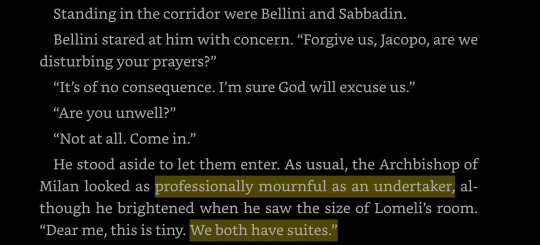
The book also brings the information Bellini had been Archbishop of Milan before him and of course Sabbadin is introduced in the book as Bellini’s praetorian guard, which, again, is very unique wording:

And Harris doubles down on the description by making Lomeli say in the next page:

In conclusion, I just find this all very interesting and my intention is to explore this visual detail in the cinematography with my interpretation of the queer-coding of Bellini/Sabbadin as a couple in Harris’ book. Thanks to OP for pointing out the ashtray in the first place, thanks to @ tomwambsgansdarkglasses for going through this with me at 1am last night.
PS: If you think my tinfoil zucchetto is too big already, just wait till you find out that I went to sleep trying to discover what that blue led display in the right corner of the shot/on the other table in his suite is. A minibar/electric kettle/coffee maker that each cardinal has in their suites? I’ve checked the tutorial of Tremblay’s coffee machine and that one seems only his own. I’m trying to find the exact match. This is my idea of fun.
#aldo bellini#conclave analysis#giulio sabbadin#cardinal sabbadin#sabballini#conclave robert harris#conclave 2024#conclave#queer coding#queer#conclave meta#meta analysis#jacopo lomeli
225 notes
·
View notes
Text
kinda long homura rant/analysis
“homura doesn’t care about anybody but madoka !!!!”
literally homura:
originally tried to save all of the girls before she eventually gave up bc it was literally impossible,
literally ran like hell to get sayaka’s soul gem back after madoka chucked it off the bridge and even closely inspected it w such care to make sure it wasn’t damaged at all,
admitted that she has hurt people (most likely the magica quartet, aka all of her friends, bc who else?) and feels immense guilt abt it and wishes she could erase it all (she literally says that hurting mami hurt HER),
can’t bare to kill mami (she looks so conflicted and sad when pointing the gun at her) and can’t even look at her when she shoots her in the leg bc she rly doesn’t want to hurt her,
subconsciously created a desired reality that she brought all of her friends (even kyosuke and hitomi, implying that she even cares for them as well) into where alive, happy, and together (ppl seem to forget that homura’s labyrinth was literally what she’s wanted deep down before it started to fall apart as she realized it was fake; sayaka literally points out how a witch who just wants to keep everyone happy and out of harm can’t be that bad, and kyuubey points out how homura would have most likely preferred to stay in this fake, happy world instead of realizing the horrible truth),
apologizes to kyoko for “getting her involved in this” after she realizes that she herself is the witch, aka most likely apologizing for wasting kyoko’s time when she asked her to go to kazamino city w her and for calling her,
rewrote reality in order to bring sayaka and bebe back to life and give everyone the happy life they always desired and deserved (she is literally willing to proclaim herself as “evil” and “the devil” and be unhappy if it means that madoka and everyone else gets to be happy and alive, safe from all the pain and the incubators who are still trying to prey on them and all magical girls)
… but she only cares abt madoka?
#💀💀💀#like c’mon guys…#it’s right in front of ur face…#we can’t be THAT media illiterate 😭#akemi homura#homura akemi#madoka magica#madoka magica homura#mahou shoujo madoka magica#pmmm homura#puella magi madoka magica#akemi homura rebellion#akuma homura#devil homura#homura akemi my beloved#mahou shoujo madoka magica rebellion#puella magi madoka magica rebellion#madoka magica rebellion#media literacy#common sense#media literacy is dying#media literacy is dead#character analysis#analysis#meta analysis#show analysis#media analysis#fandom critical#fandom critique#fandom criticism
550 notes
·
View notes
Text
The Inferno Theory: The Chara Theory to End All Chara Theories

Here we are! Nine years of Undertale. And seeing how Chara is heavily associated with the number 9 (AND THAT TOBY FOX FINALLY TALKED ABOUT THEM), I can't think of a better way to celebrate the occasion than by dedicating this 5000-word-long theory about them? Y'all remember when people used to make long-ass theories about Chara? Yeah, they're coming back with a vengeance! To say I have a colossal hyperfixation is a massive understatement. No character in all of fiction has had a bigger impact on my life than this little rose-cheeked, cocoa-addicted freak. I’ve been a Chara fan for as long as I’ve been an Undertale fan, and you can bet that my understanding of them has changed a lot since. And now I have the pleasure of sharing said understandings with y’all!
Once upon a time, there was an aroace autistic who, like most of y’all, had a very unhealthy obsession with Undertale. And unlike most of you, he thought the Genocide Route was really fun. Most fans talk about how unhappy they felt killing everyone, but for me, I felt like a polar bear at a baby harp seal convention. I got a disturbing level of happiness out of turning everyone to dust. Hell, the only unhappiness I felt was when I couldn’t turn Monster Kid to dust.

Oh well, at least I got a good consolation prize!

I was one sadistic son of a gun, and so I was even more delighted to find out I had a secret admirer/partner-in-crime and that they joined in on the fun because I was such a goshdarn inspiration to them. Not wishing to disappoint my self-appointed partner, I erased the world without a second thought, eagerly awaiting what we might get to do together.
So you can guess I was pretty taken aback when, instead of a warm welcome, they started lecturing me about how I couldn’t accept the world’s destruction and that I was the one fully responsible for it (even though they were eager to take credit for it earlier). I didn’t think much of it at first. Initially, I just thought that they were just irritated that I was undoing what we had worked so hard to accomplish.
But as this game taught me time after time, you should never trust your first impressions. Those first impressions would crumble to dust when they said this.
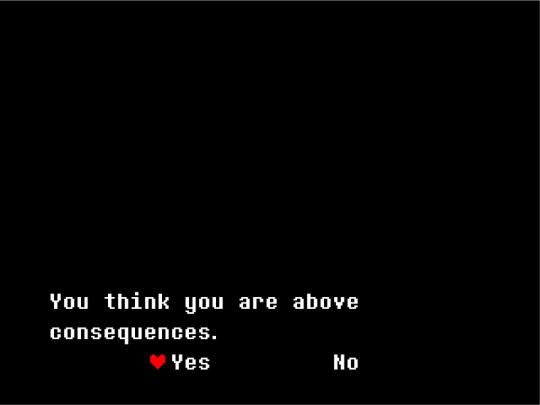
To say I was completely baffled is an understatement. Why the hell would this prepubescent genocidal maniac be so obsessed over whether or not I think I’m above consequences? So obsessed to the point they would tell me to go to hell if I told them no? It was at that moment I realized there was something more to this character than meets the eye. But for a long time, I couldn’t seem to figure out what that something was. And it didn’t seem like anyone could figure that out either.
I’m very much a veteran of the fan wars that have emerged surrounding Chara. In fact, one might even say I am a deserter of sorts, as I am a former member of the Chara Defence Squad, Offense Squad, and Neutralist Squad. But I’m not gonna be a stuck-up and say everyone’s a canon-ignoring idiot except for me and that I’m the only one who knows what Toby Fox intended Chara to be. Even though I ended up with a very different take than yours (and will certainly argue why it’s the best), I owe you all your discussions a huge debt, and I wouldn’t be here if I hadn’t gotten invested in your interpretations, to begin with. Not to mention that, contrary to what some may argue, you’ve made some valid points to complement them.
And while the debate that resulted from Chara’s ambiguous morality has led to a lot of controversy and even toxicity, it has also been a source of some FANTASTIC CONTENT. Like seriously, would we have gotten those badass renditions of Stronger Than You if no one thought Chara was an awful person? Would we have gotten Man on the Internet’s beautiful rendition of Star if no one thought Chara was a good person (turned awful)?

It would be utter hypocrisy for me to ask of you to approach me and my arguments (or anyone who accepts them) with understanding and good faith only to then not do the same to anyone who doesn’t agree with me. In this theory, I will definitely argue why some points made about Chara are flawed; points that you might hold yourself. But that doesn’t automatically mean that you (or your takes) are intellectually or morally inferior to mine. And besides, I’m not Toby Fox.
So with that said, why did I eventually came to disagree with pretty much everyone about Chara? Because, one way or another, I couldn’t find a take that clicked with me personally as I felt there were various inconsistencies and issues holding them back. I looked at YouTube videos, subreddits, Tumblr essays, Twitter threads, and even forums on the Steam Community. But I couldn’t really find what I thought were satisfactory answers to the questions I had about Chara’s motivations, role in the game, and relationship with the player.
And then, one day, I found those answers. It all happened when I asked myself: “What if Chara didn’t turn against me… because they were always against me from the start?!”
I don’t mean that Chara only saw you as a means to an end. I mean that YOU were the end. What if Chara didn’t use you so they could screw over the monsters but they used the monsters so they could screw over YOU.
You probably think I’m insane, don’t you? And you’re right! I AM INSANE! AND SO IS THIS WHOLE DAMN THEORY!!! But somehow, someway, it just works!! And I’ll show you why and how!!!
What you are about to read is the culmination of six years of reading and critiquing Chara takes and theories of every kind and quality, whether it be Judgement Boy’s Who is the Real Villain of Undertale to Wandydoodles’ Oblivion Theory. Six years of examining the arguments and counterarguments of Chara defenders, offenders, and neutralists alike. Six years of looking in every corner of the UTDR fandom. From the tranquil lands of Quora. To the dark recesses of Reddit. To the intellectual wastelands of Twitter. To the fiery hellsite of Tumblr. So, without further ado, get ready for some of the most pure, unadulterated, high-octane, universe-collapsing neurodivergence you’ve ever seen in your life!!!!!
Part 1: The demonic heritage of the "demon who comes when people call its name".
Have you ever had one of those moments where you’ve asked yourself, “What the actual hell is this guy talking about?” I bet you’re having that moment right now. Everything about their character post-death, including their motives, their methods, and their relationship with you, is perfectly reflected in one of their most famous (or rather infamous) lines:
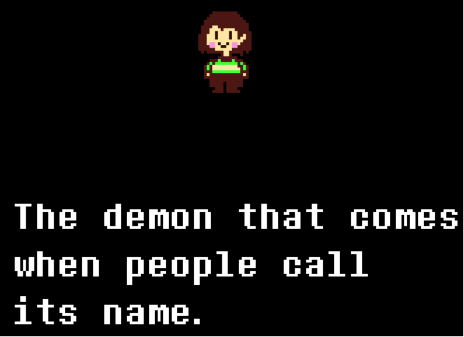
When most people hear the word demon, the first thing that comes to mind is a being made of pure evil whose only purpose in life is to destroy all things good in the world. Right?
Well, yes, but actually, no. It’s a little more complicated than that. To argue that Chara is a demon because they’re simply “an evil little twerp that enjoys being evil” doesn’t do them or their role in Undertale justice (although that hasn’t stopped people from trying to argue that). To understand why calling themselves a demon is EXTREMELY important, we need to dive into the wonderful (and totally not controversial) world of religious beliefs!
In ancient and modern religions, demons are a little more complex than just ethereal jackasses with a vendetta against virtue and righteousness. Though they vary from faith to faith, most demons have a specific set of qualities and tropes that make them integral to whatever faith they’re in. You also see these demonic qualities in fiction that’s derived or inspired by religions, and since Undertale’s lore and worldbuilding have a heavy emphasis on the spiritual and divine, you can see them in Chara. Since Undertale is a game of “Western” origin, you can definitely see they share qualities that are all too familiar with devils of “Western” religions. In classic devil fashion, they target those with weak integrities or suspect morals; they tempt you with the promise of fulfilling your desires at your and everyone else’s expense; they’re able to control your body as you grow their power through your sins, and hell, they even do the thing where they make a deal for your soul. Also...

But though it's evident that Chara encourages you to do “evil,” THEY THEMSELVES are not responsible for it. Yes, Chara encouraged you to kill, but YOU are the one who acted on those encouragements. In fact, YOU are the one who encouraged THEM to help you out! They walked down the dark path with you, but you didn’t really give them anywhere else they could walk. You had all the power and every chance to turn back and no reason to keep walking. And yet you persisted.
But that does beg the question, why did you walk it at all? What could possibly inspire you to give all of these characters happiness, satisfaction, and peace and then rip it all away? Because you decided that giving everyone the most satisfying ending was not satisfying enough for you. Because there was more that you could experience for yourself, even if it meant making everyone else experience something absolutely horrific. It wasn’t enough for you to fill the glass only halfway. You needed to fill it to the brim. You wanted to reach the absolute. Even if doing the Genocide Run was a bad experience for you, you CANNOT deny it was a fulfilling one. And Chara knows it, too. It ain’t exactly a coincidence that fulfillment and fullness are recurring motifs in Chara’s character.

Like all demons, Chara is able to tempt the wicked and sinful by targeting our greatest weaknesses and deficiencies. It’s no different from how Succubi and Incubi target those who succumb to the sin of lust. That’s why you won’t go after my aroace ass anytime soon. But I digress.
But Chara doesn't just tempt us by exploiting our need to fill the glass to the brim but also because of how they exploit the satisfaction we get from watching it fill up, that is to say, the satisfaction that comes from trying to achieve fulfillment.
We humans are addicted to progression as much as we are to completion, and in an RPG like Undertale, the satisfaction of progression comes in the form of NUMBERS. Not just the numbers that flash on the screen when you battle enemies but also the ones that go up when you finish said enemies off, whether it be your hit points, experience points, and so on. And Undertale isn’t any ordinary RPG; it’s one where its RPG elements are interwoven into the fabric of the game’s universe. Because of that, Chara is able to use these elements in their world to influence those outside of it.

But Chara does not just influence us through the numbers that increase but also the ones that decrease. That’s why the first thing they do when we reach Snowdin is give us a tally.

It’s not just there to measure progress. It’s also there to incentivize us to keep progressing. It gives us a small dose of satisfaction that’s enough to distract us from the mundanity and misery of the murder run, like a loading bar on a loading screen. And just like with loading screens, the farther it progresses, the harder it gets to turn away. Why would you want all the lives you’ve taken and the stats you’ve gained to amount to nothing? Why would you want to hit reset and go through those brutal fights with Sans and Undyne again? You can’t empty out the glass, not when you’re that much closer to filling it to the brim. Speaking of Sans and Undyne, it’s quite interesting that even though they barely know you, they know exactly why you won’t take your foot off the pedal, so to speak.

But that’s not the only thing driving you, isn’t it? Chara knows that there was something else that was spurning you along. Something more powerful and more dangerous than your addiction to progression and completion: PRIDE.
Perhaps the real reason you kept giving in to sin until it was far too late was because you didn’t think it would be too late. You didn’t hold back because you thought you would be able to go back. You thought you could just absolve your sins with the press of a button like you did in countless worlds before. You thought you could dive in, touch the bottom, and come back out of the water. But what were you getting into? How deep would you have gone? And would you have gone in if you knew you couldn’t possibly return? You know you wouldn’t. And Chara knows it, too. That brings us back to the dialogue I showed you at the beginning of this theory. The one said changed everything I knew about this character, and I firmly believe that this is the MOST important line of dialogue in the entire franchise.
PART 2: THE PART WHERE I (PRETEND TO) DESTROY 9 YEARS OF ESTABLISHED FANON!
When I say that that little blurb about being above consequences is ABSOLUTELY ESSENTIAL, I do not say that lightly. It isn’t just important to Chara's character, but the game of Undertale as a whole! Anyone who’s serious about Chara’s character should never take this for granted because Chara sure as hell does not.
It’s not just our refusal to accept the world’s destruction that’s a huge-ass deal to Chara; it’s the arrogance and complacency that accompanies it, rooted in the position and privileges we have as the player. It matters to them so much that they’re willing to completely forgo bartering for our soul (which they say they want) if we don’t admit that we have that belief!
And yet, despite Chara taking this subject so seriously, the people who are analyzing their character ironically don’t. Generally speaking, most people simply brush this line off as nothing more than something they do to help them on their quest to achieve their goals. So, with that said, let’s talk about what those supposed goals actually are.
In all my years of reading and assessing countless Chara theories and interpretations, I’ve discovered that everyone actually agrees on what Chara's goals are. They just can’t agree on why they want them. Said goals are A) reach the absolute, B) max out their numbers/power, C) erase the world, and/or D) eradicate all monsters. But what if it’s actually the other way around? What if those things were the means to an end rather than the ends themselves?
What if the true goal of the “demon who comes when people call its name” was just like that of the demons of old: not to be your partner in crime, but to torment and punish you for your crimes? To make you face CONSEQUENCES!
I’m not making this argument simply because it makes Chara look more badass (though I think it totally does, lol). I firmly believe that Undertale’s post-Genocide content is written so that Chara’s character can only make sense if that was Chara’s goal from start to finish. Because if Chara’s endgame was any of those four I mentioned earlier, their character kinda falls apart because they're awfully inconsistent about fulfilling them. And those inconsistencies are evident in the Second Geno Ending.
Discrepancy 1) They say they will “appear time and time again” to help us “eradicate the enemy and become strong,” and yet they call us perverted for eradicating everyone time and time again.

You can argue that they didn’t want us to recreate the world in the first place and just move on to another world, but if so, why let us come back at all? And if it’s to get our soul, why do they keep around this world after we have it? This leads us to...
Discrepancy 2) They tell us to ERASE the world and move on to the next, and yet they allow us to restore it without a hitch after we give them our SOUL, seeing how there’s no black void when we start the game again.

If Chara was powerless to stop us from coming back, this wouldn’t be such a big deal. But they CLEARLY DEMONSTRATE that they’re able to stop the player from restoring the world, as seen in the first post-genocide ending. And yet they don’t use this power after the first time the world is erased (WHICH YOU WOULD THINK THEY WOULD WANT TO USE SINCE THEY WANT TO ERASE THE WORLD AND MOVE ON TO ANOTHER)! Seeing how the world is back again without us doing anything makes the restoration of the world like something that Chara CHOSE ON THEIR OWN VOLITION. And what makes this all the more damning is...
Discrepancy 3) They tell us they’re down bad for increasing our ATK, DEF, EXP, and LV to the max and erasing the world and everyone in it, and yet they TELL US TO DEVIATE FROM THE ONLY ROUTE THAT ACCOMPLISHES THAT (which, as stated before, they call us perverse for doing it again).

So, let me get something straight. You tell us you want to ”eradicate the enemy” and “ erase this pointless world,” and yet not only are you allowing us to undo all of that, you want us to do something INSTEAD OF THAT??? It’s funny how you lecture us about how we cannot accept the world’s destruction BECAUSE, APPARENTLY, YOU WON’T EITHER!!!!! Also, before I forget...
Discrepancy 4)
WHAT KIND OF MISANTHROPE DEDICATES THEIR WHOLE LIFE TO WIPING OUT HUMANITY, GETS GIFT-WRAPPED A CHANCE TO DO THAT, AND THEN JUST PASSES IT UP?!?!?!

On behalf of misanthropes everywhere, I am DEEPLY disappointed in you!
So it doesn’t matter if you believe Chara is always evil, good, or detached from morality entirely. Because Chara has the same goal across all versions, they all succumb to the same inconsistencies!
Funny how most people see them as this embodiment of the addictive nature of levelling up and consuming everything in a piece of media and all that jazz WHEN THEY SEEM TO CASUALLY GIVE UP ON IT!!!!!!
And if you argue they want a Soulless Pacifist Run when they suggest “another path,” then ask yourself, what does that give them that a Genocide Run doesn’t? Keep in mind, aside from a scribbled-out photograph, we don’t see how many monsters or humans they killed besides the main characters or how much power and stats they gained from it. And it’s not like we see them erase the world afterward since only the genocide run has that infamous wall of red 9s. Not to mention, the genocide run is the most secure way of accomplishing their goals since they have the backing of the player. Not only that, but it’s also the safest and most efficient way to erase everyone and increase stats to the fullest, and we all know how Chara feels about efficiency.
So Chara has no reason to pick the Soulless pacifist ending over the Genocide Run if they want to achieve their end of increasing numbers and consuming the world… unless those things were a means to an end rather than ends themselves.

Indeed it is coming together! That’s the other reason their statement, “You think you’re above consequences,” is so damn important! They’re not telling us why we sinned, but it reveals they intend to make us suffer for those sins, and how.
That’s why Chara is seemingly so inconsistent about erasing the world. Because it was never about the world. It was all about YOU.
[SIDE NOTE: I’m sure many of you will point out that if Chara wanted us to get a Soulless ending in this world, then why would they encourage us to “move on to the next?” I don’t think this is too big an issue for two reasons. First, this line is meant to emphasize that, like all demons, Chara is inescapable and that no matter what world you go to (within their own universe), Chara will always follow you now that you’ve unleashed them. Second, because their goal concerns us and not the world they’re a part of, their character avoids the aforementioned inconsistencies that hamper the other Chara theories much more severely, in my opinion.]
Part 3: Contrapasso
Now I’m sure some of y’all might think that Chara doesn’t need to yearn for our torment to achieve the impact of the Soulless ending and that just because Chara is a demon doesn’t automatically mean they need to screw us over. You are right in that not everyone who makes a Faustian Bargain needs to have malicious intentions toward the people they’re taking advantage of (Kuybey from Madoka Magica is a great example of that). But Chara does need it! Not only does it make their character more narratively cohesive, but also makes their character more thematically impactful. And it’s more in tune with their demonic nature for them to want to torment us.
Because demons represent something more terrifying than evil itself. They represent the terrible price of embracing it, a price that all evildoers fear more than anything, and that all demons want seek to inflict upon us. Like most demons, Chara isn’t encouraging us to sin to fill the emptiness in our soul (or even their own). They did it to perpetuate that torturously empty and unfulfilled state for all eternity, a state which even themselves now endure.
Now, you’ve probably noticed that I’ve talked a lot about the themes of fulfillment and emptiness, and it’s for a good reason since those themes are heavily featured in Undertale. I mean, how could it not? Because concepts of demons, hell, and sins (which are explicitly mentioned in the game) are deeply intertwined with the concept of emptiness. The theologian Thomas Aquinas once defined evil as not a presence but as an absence (of that which is good). Darkness is the absence of light; war is the absence of peace; bigotry is the absence of tolerance; pride is the absence of humility, etc. You see this reflected in not just Christian theology but also fiction as a whole, as a lot of villains are motivated by a desire to obtain something that they believe can’t be without. Whether it be wealth, status, recognition, power, the death of an individual, or even just sadistic pleasure.
Since demons are beings that are inseparable from evil itself, the life of a demon is forever cursed by unceasing and unbearable emptiness. Hell, the word damnation originated from the Latin word damnum, which literally means loss! They’re not exactly partying in hell while your immortal soul is being slow-roasted for eternity. They’re burning in that lake of fire and brimstone along with you! They can’t end their damnation, not because they don’t want to but because they simply can’t. They’re fated to be bereft of the satisfaction or fulfillment found in Heaven or Earth, a fate that is worse than death in every sense of the word, especially since they can’t experience death anymore. Because of that, a demon embodies what is perhaps the most terrifying form of evil of all: not one rooted in a desire to rid the emptiness and unfulfillment within themselves, but a desire to inflict them upon others. Because as a wise philosopher once said:
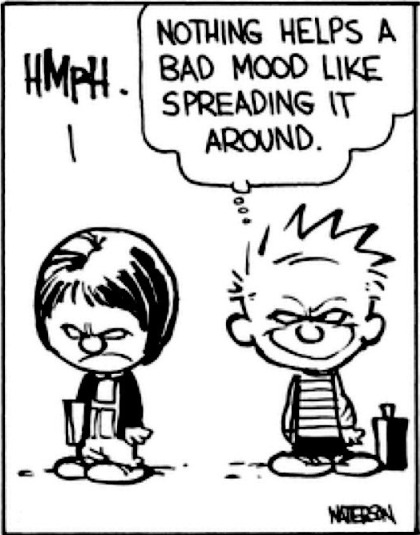
We see this horrific state of mutually assured suffering everywhere across fiction. From goofy, lighthearted tokusatsu's...
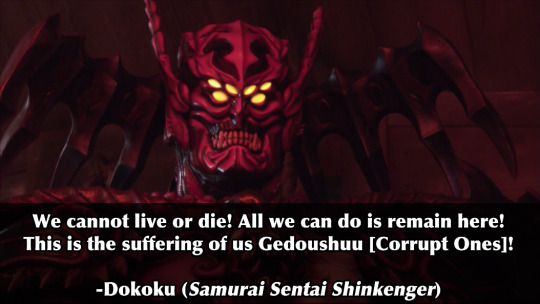
...to nightmarish sci-fi dystopias...
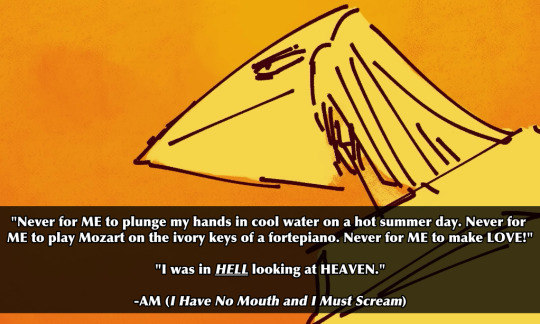
...to a little indie game made 9 years ago.

Oh yeah. Don’t think I was gonna talk about emptiness without mentioning everyone’s favourite homicidal fauna-turned-flora, especially not with lines like this.
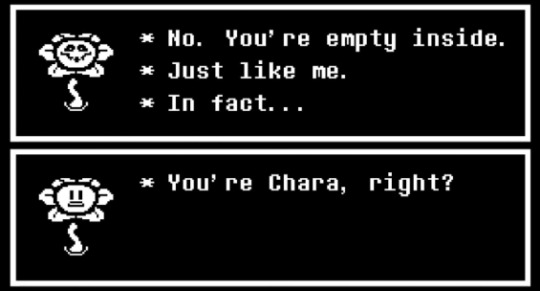
Take one to know one! And it can’t be a coincidence that the game emphasizes the theme of emptiness when giving the spotlight to the three characters that have committed the most “evil”: Flowey/Asriel, Chara, and YOU.
Quite the unholy trinity going on here, eh? It truly is fascinating how the emptiness led us to work with each other to exterminate all monsters. And it’s also interesting how the unique kind of emptiness we have eventually led us to work against each other. Whether it be Flowey wishing to preserve his sentimentality for his long-gone sibling, us players wanting to maintain our (perverted) sentimentality for the world of Undertale, or Chara weaponizing these sentimentalities to exact their misanthropic hatred.
Remember how I said that Chara was a lousy misanthrope because they keep letting us bring back the humans they wanted annihilated when they were alive? That does make them a lousy misanthrope… unless their misanthropy found a higher priority target: YOU!!!!!
Chara’s desire to torment us didn’t come out of thin air. The same hatred that drove them to wipe out the humans of their world years ago is the same hatred that’s driving them to get at the humans of our world, even if it means destroying those who once embraced them. And now, that hatred is more potent and destructive than ever before, so much so that it’s no wonder Toriel was able to feel it when she endured that fatal blow after the Geno Run began.
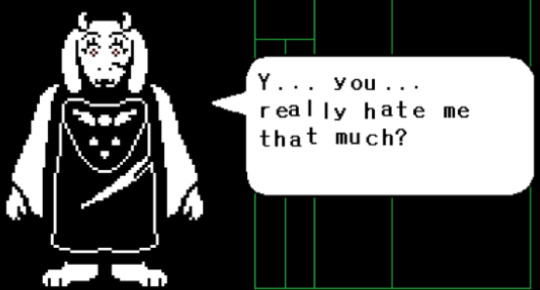
Do you think witnessing what soullessness did to sweet little Asriel wasn’t already terrifying and tragic enough? Just try to imagine what it could‘ve done to a vengeful, traumatized, chocolate-addicted problem child so consumed by hatred that they poisoned themselves just for a chance to wipe out their own kind. All of that hatred of humanity is still alive and well, and now it has no humanity to hold it back.
And what could be a more fitting target for a MISANTHROPE that calls themselves a DEMON… than a HUMAN that wants to play GOD?
After all, the only thing demons love more than tormenting mortals is warring with Gods.

Why else do you think that Chara winks right at you if we make Frisk stay with Toriel? Because that’s who the Soulless Ending was meant for. It’s when they’re finally able to unleash all that animosity and hatred that’s been lurking behind that smile ever since we killed everyone in the Ruins. It’s the moment that they’ve been patiently waiting for because they knew that’s when it would hit you the hardest.
And what makes the Soulless Pacifist Ending very special compared to other “bad endings” isn’t simply because they destroy those we pretend to care about (may I remind you that you did do the genocide run, after all). But they destroy something much more valuable to us as the players: OUR OMNIPOTENCE. Chara doesn’t destroy people for the sake of destroying them. But because in doing so they destroy our arrogant belief that nothing could possibly challenge the invisibility and invulnerability we players take for granted.
It's all too human that those with the most power are the least willing to lose it (or even take responsibility for it). And in a world where we should have absolute power, we thought there would be no consequences for abusing it. So what could be a more fitting and frightful punishment than having to actually face them? Missing out on the best ending in a video game is one thing. But to forever lose the power to achieve it ever again?! Now that’s terrifying!
Throughout myth, legend, and religion, sinners are often punished in a way befitting of the sin they’ve committed. In Greek Mythology, Tantalus was damned for trying to feed the Gods the flesh of his murdered son with eternal hunger and thirst despite being within arm’s reach of water and food. In Dante’s Inferno, those who succumb to wrath are forever doomed to fight each other in a river of mud. And since Undertale is no stranger to concepts such as hell, sins, and demons, you can damn well be sure that there’s going to be damnation fitting for the sins that drove you to complete the genocide run.
You completed the Genocide Run because you believed ending their lives would be fulfilling. Now, you can no longer get any fulfillment out of saving their lives.
I mean, where else can you get your precious fulfillment? Those paltry neutral endings? They only offer a fraction of what the pacifist ending offered. And the genocide ending has been drained of its satisfaction like the pacifist! Would you do all that tedious grinding and brutal boss fights just to hear your so-called “partner” lecture you again on perverted sentimentality and say you should choose another path, even though there’s nothing that they could offer? Of course not. In the end, you’re just like poor Tantalus agonizing in the pits of Tartarus, feeling the water vanish from his hands just before it touches his lips.
The ultimate triumph of Chara isn’t making you suffer a total defeat, but perhaps something much worse to you as a gamer: a pyrrhic victory. It’s like having a Twinkie that's been drained of the creamy center. Everything is still there except the thing you treasure most. You’re damned to play a challenge forever deprived of any and all fulfillment you once got from it, a satisfying journey that will always be doomed to reach a dissatisfying destination.
In the end, Chara leaves you with the world exactly as they described it the first time they met you face-to-face: POINTLESS.
You can have the world exactly as it was before (and the people within it). But in the end, Chara will always have the last laugh.
Figuratively and literally.
Welcome to hell!

Part 4: Why Consequences Matter
Woooooo!!! Man, that was quite the read, wasn’t it? And yeah, I wasn't kidding when I said this is going to be autistic as all hell! I don’t doubt you have a lot of thoughts in your mind, and then you’re gonna share them by the time you’re finished reading this post. Some of you might think this is the Chara theory to end Chara theories. Some of you believe that this is the worst thing that has happened to this fandom since Sebastian Wolff. Some of y’all, I’m whitewashing them because I argue they’re driven by a desire to punish the wicked by any means necessary. Some will think I’m demonizing them because I say that they’re, well, a demon.
[SIDE NOTE: Just so I don’t miscommunicate what I believe about Chara’s morality, here are some key points to take away from this theory. A) Chara sought to make you pay for the evil you committed. In fact, the idea that the Soulless Ending is Chara punishing our sins has been around for a while, especially by those who think Chara was “corrupted. B) However, in this theory, Chara's actions are all done with the intent of accomplishing that goal. This means that Chara was aware of what they were doing, they wanted to do it, and that THEY KNEW IT WAS EVIL. C) But you still have to remember that Chara is also A LITERAL CHILD. And D) They’re a child who endured a great deal of hardship (and possibly trauma), which made them so embittered and vengeful. Also, E) Remember that they’re also soulless, just like Asriel when he was Flowey.]
But I think most of you were gonna look at this interpretation of Chara and feel the same thing that I have about most of yours: a take that’s not without issues, but not without a fair bit of interesting points.
But regardless of what you think of this theory overall, there’s one thing I won’t leave up for debate: I deeply treasure Chara’s character. Not just because I think they’re fun, cool, or interesting but also because I firmly believe they’re invaluable Undertale. And yet, at the same time, I think they’re severely undervalued by the fandom. And who can blame them?
The characters of Undertale speak very little of Chara, and Chara speaks for themselves even less. But just like Johan Liebert from the anime Monster, even though they’re not seen too often, they still manage to exert a massive presence and impact within Undertale’s narrative. And that presence is made all the more impactful because they perfectly represent the themes of the narrative: and that theme is CONSEQUENCES, or more accurately, the CONSEQUENCES OF VIOLENCE.
From the violence that drove Chara to climb Mt Ebott to the violence their brother Asriel inflicted in hopes of being with them forever. From something as grand as a war between two civilizations to something as small as dismembering a snowman. Everywhere you look, you will see that violence (and its repercussions) haunts the story and characters of Undertale. But what makes Undertale stand out from other media that tackles this subject is that it’s not just an integral part of its narrative but also its metanarrative. The most ingenious way it does this is by giving meaning to the actions/mechanics that we take for granted, specifically monster encounters.
Our Lord and Saviour Toby Fox said it best:
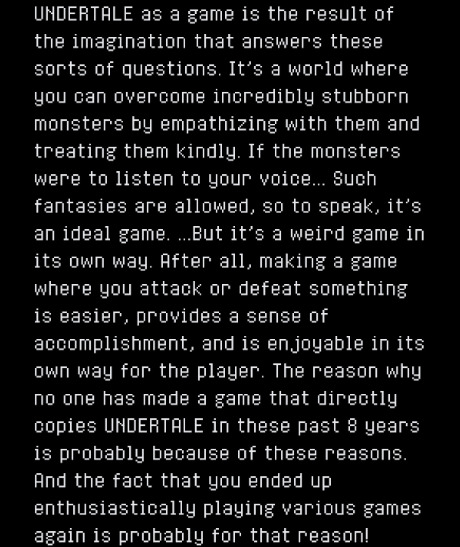
Because the monsters of Undetale are treated as something more than just enemies to be killed, there are going to be consequences for choosing to kill them away. Some argue that it goes too far in how it admonishes you for killing even a single monster, even to the point of being preachy (I’m looking at you, ScottFalco, but that’s a response for another day).
That argument is deeply flawed because it fails to account for the fact that without these ramifications, the game’s themes would be rendered null and void. The last thing that a game with a narrative centred around the consequences of violence can afford to do is afford you the luxury of avoiding them. And that principle especially applies if you dare to choose nothing BUT violence.
If you were to bring them all back as if nothing happened, then your decision to commit genocide would be completely meaningless, which would totally disservice Undertale themes regarding violence. There needs to be consequences. LASTING CONSEQUENCES. Undertale can’t drive home its messages and them without lasting consequences. Undertale can’t deliver those consequences without Chara in the driver’s seat. And Chara’s character can only be at their most narratively cohesive and thematically impactful if seeking to make us suffer consequences was their intended destination.
Regardless of whatever detail about Chara you’re discussing or what side of the discussion you’re on, one thing is very clear: they’re absolutely essential to Undertale in the same way that Mephistopheles is essential to Faust, the Cenobites are essential to Hellraiser, and Kuybey is essential to Madoka Magica. And they’re the only ones with the means, motives, and deep-seated misanthropy to hold this whole damn game together.
Sans is right. We deserve to be burning in hell for what we did to those poor monsters. And I can't think of anyone more qualified to have us humans “burning in hell” than a self-proclaimed demon with a seething hatred of humanity.
And how fitting is it that the skeleton who judges our sins is followed by a human child who punishes us for them?
BUT HEY, THAT'S JUST A THEORY!
A CHARA THEORY!
THANKS FOR READING!
#chara#undertale#undertale 9th anniversary#deltarune#sans#chara dreemurr#asriel#flowey#frisk#toby fox#undertale theory#toriel#asriel dreemurr#chara undertale#sans undertale#utdr#safe utdr#undertale fandom#undertale asriel#ut chara#undertale anniversary#meta analysis#character analysis#actually autistic
466 notes
·
View notes